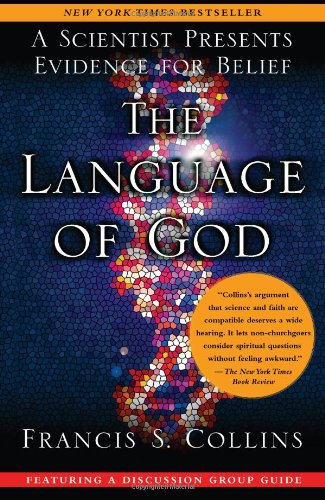Book review: The Language of God
by Francis S. Collins
★★★★★
Current-day proponents of the New Atheism like to push the idea that atheism is the only rational belief, and believers are weak-minded non-thinkers who hide from science. This just simply isn’t so. Some very accomplished scientists in many different fields are believers.
Here’s one. Francis Collins is a devout believer and distinguished scientist (he is the head of the Human Genome Project) with a questioning mind and a reverence for reason … and for the merger of science and religion. From the cover flap, “In short, Dr. Collins provides a satisfying solution for the dilemma that haunts everyone who believes in God and respects science. Faith in God and faith in science can be harmonious–combined into one worldview. The God that he believes in is a God who can listen to prayers and cares about our souls. The biological science he has advanced is compatible with such a God. For Collins, science does not conflict with the Bible, science enhances it.”
That’s a pretty intriguing claim, and it aroused my curiosity. In this book, Collins wrestles with questions like “What came before the big bang?” and “How did life originate?” I should set things in perspective before continuing; Collins is not promoting some flaky version of pseudo-science. He’s for real. He praises Darwin and admits that no serious biologist today doubts the theory of evolution. “The relatedness of all species through the mechanism of evolution is such a profound foundation for the understanding of all biology that it is difficult to imagine how one would study life without it.” A lot of effort is spent explaining “biological truth,” and in a chapter titled Deciphering God’s Instruction Book, Collins introduces–no, not the Bible–the lessons of the human genome.
Still, Collins respects the Bible. He dives into the debate about what Genesis really says, and why we have contradicting versions of the creation in the Bible if this poetic and allegorical writing was really meant to be read literally. Young Earth Creationism just simply isn’t compatible with modern science; neither, really, is the trendy Intelligent Design explanation. Thankfully, Collins finds an ultra-literal interpretation of Genesis unnecessary. Collins proposes a solution for compatibility, which he calls BioLogos. He finds harmony between science and religion in “theistic evolution.”
Finally, having dispensed with our concerns regarding the science-versus-religion conflict, he brings up the crux of the matter. Regardless of where else we are to read the Biblenonliterally, evidence supports the fantastic story of a unique individual, Jesus, who lived, died, … and rose from the dead! Collins leans a bit on C. S. Lewis as he builds toward the climax: he, a rational scientist,logically concludes that the Jesus story is true and literal. God came down to earth in the form of a person. Wow!
While not convincing enough in itself, and leaving many other questions about the believability of the Christian God unanswered, I do highly recommend this book! It will never turn a nonbeliever into a believer, but it will definitely refine the faith of believers, helping them to overcome the dogmatism of outdated theology. Besides, it’s a fun, educational read!












 354 Circles
354 Circles
 603 Goodreads Friends & Fans
603 Goodreads Friends & Fans

 Hello! I'm an author, historical Jesus scholar, book reviewer, and liberal Christian, which means I appreciate and attempt to exercise the humanitarian teachings of Jesus without getting hung up on any particular supernatural or religious beliefs.
The Bible is a magnificent book that has inspired and spiritually fed generations for thousands of years, and each new century seems to bring a deeper understanding of life’s purpose. This is true of not only Christianity; through the years, our age-old religions are slowly transforming from superstitious rituals into humanitarian philosophies. In short, we are growing up, and I am thrilled to be riding the wave.
I avidly read all thought-provoking religion titles. New authors: I'd love to read and review your book!
Hello! I'm an author, historical Jesus scholar, book reviewer, and liberal Christian, which means I appreciate and attempt to exercise the humanitarian teachings of Jesus without getting hung up on any particular supernatural or religious beliefs.
The Bible is a magnificent book that has inspired and spiritually fed generations for thousands of years, and each new century seems to bring a deeper understanding of life’s purpose. This is true of not only Christianity; through the years, our age-old religions are slowly transforming from superstitious rituals into humanitarian philosophies. In short, we are growing up, and I am thrilled to be riding the wave.
I avidly read all thought-provoking religion titles. New authors: I'd love to read and review your book!
 Hi! While Lee writes the articles and reviews the books, I edit, organize, and maintain the blog. The views expressed here are Lee's but I'm his biggest supporter! :-)
Hi! While Lee writes the articles and reviews the books, I edit, organize, and maintain the blog. The views expressed here are Lee's but I'm his biggest supporter! :-)
Connect With Me!